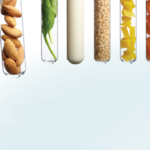
Naturally found in plants, fruits, and seeds, bioflavonoids are important phytochemicals that promote health. Since they’re such a large family of compounds, bioflavonoids are categorized into different groups based on their structure, including isoflavones, anthocyanins, and flavonols. The most well-known flavonol is quercetin.
First discovered by Nobel Prize recipient Albert Szent-Györgyi, quercetin can be found in a variety of foods such as apples, grapes, berries, onions, buckwheat, tomatoes, capers, red wine, citrus fruits, and black tea. While there’s no shortage of foods that provide benefits, additional health gains can be reached with the use of quercetin supplements to obtain therapeutic amounts of this valuable nutrient. In fact, supplemental quercetin is often sourced from the Sophora japonica tree flower bud, which has long been used in traditional Chinese medicine to address high blood pressure, hemorrhoids, headaches, and more.
Quercetin is a well-known antioxidant, helping to protect us against oxidative stress due to factors such as unhealthy lifestyles and environmental toxins. It is an even more powerful antioxidant when compared with vitamins C and E. Quercetin has been identified as a blood vessel protectant and recognized for its anti-inflammatory and antimicrobial activities. Therefore, quercetin may help support concerns related to allergies, heart disease, bone health, and immunity.
Quercetin’s efficacy is limited by its low solubility and absorption. In foods, quercetin is naturally bound to sugar molecules to form quercetin glycoside. When extracted for supplements, these sugar molecules are removed, producing quercetin aglycone, a form that is difficult to absorb. In addition, quercetin is soluble in fat, but not water. Why is this important? Not all quercetin supplements are created equal, and it’s important to look for ones that use methods to improve quercetin’s bioavailability. Making quercetin water-soluble and using other delivery systems such as liposomes and micelles can enhance its solubility and absorption, compared to standard quercetin supplements.
Enzymatically modified isoquercitrin
Enzymatically modified isoquercitrin, or EMIQ, is a water-soluble, highly bioavailable form of quercetin. This form of quercetin has a higher bioavailability than quercetin aglycone and provides greater health benefits than quercetin. EMIQ is approved as a safe food additive and antioxidant. Recent research on EMIQ has shown its antioxidant effects and ability to increase muscle mass among American football players when used in a protein powder supplement. Plus, it has been shown to improve endothelial function in individuals at risk for cardiovascular disease.
Quercetin LipoMicel
The Quercetin LipoMicel formulation provides an innovative delivery system to enhance quercetin’s absorption. LipoMicel uses a unique patent-pending technology that disperses quercetin into tiny micro-droplets. “Micelle” is the name given to these micro-droplets that are a few microns or smaller in size. This type of quercetin has been shown to lead to up to 10 times higher absorption than standard forms of quercetin.
Final comments
Quercetin is typically recommended at a dose of 500–1000 mg per day and appears to be safe and without any significant adverse effects when used as an oral supplement at this dose for three months. Quercetin appears to work synergistically with vitamin C and there is benefit in using these two nutrients together. Vitamin C’s ability to recycle oxidized quercetin, and the antioxidant and antiviral properties of both nutrients, make them an effective team for immune health.
References
- Dias MC, Pinto DCGA, Silva AMS. Plant flavonoids: Chemical characteristics and biological activity. Molecules. 2021; 26(17):5377.
- Salehi B, Machin L, Monzote L, et al. Therapeutic potential of quercetin: New insights and perspectives for human health. ACS Omega. 2020; 5(20):11849-72.
- He X, Bai Y, Zhao Z, et al. Local and traditional uses, phytochemistry, and pharmacology of Sophora japonica : A review. J Ethnopharmacol. 2016; 187:160-82.
- Xu D, Hu MJ, Wang YQ, et al. Antioxidant activities of quercetin and its complexes for medicinal application. Molecules. 2019; 24(6):1123.
- Anand David AV, Arulmoli R, Parasuraman S. Overviews of biological importance of quercetin: A bioactive flavonoid. Pharmacogn Rev. 2016; 10(20):84-9.
- Mlcek J, Jurikova T, Skrovankova S, et al. Quercetin and its anti-allergic immune response. Molecules. 2016; 21(5):623.
- Wong SK, Chin KY, Ima-Nirwana S. Quercetin as an agent for protecting the bone: A review of the current evidence. Int J Mol Sci. 2020; 21(17):6448.
- Jafarinia M, Hosseini MS, Kasiri N, et al. Quercetin with the potential effect on allergic diseases. Allergy Asthma Clin Immunol. 2020; 16:36.
- Kaşıkcı MB, Bağdatlıoğlu N. Bioavailability of quercetin. Curr Res Nutr Food Sci. 2016; 4(Special Issue Conference October 2016).
- Cai X, Fang Z, Dou J, et al. Bioavailability of quercetin: Problems and promises. Curr Med Chem. 2013; 20(20):2572-82.
- Kapoor MP, Moriwaki M, Uguri K, et al. Bioavailability of dietary isoquercitrin-γ-cyclodextrin molecular inclusion complex in Sprague–Dawley rats and healthy humans. J Funct Foods. 2021; 85:104663.
- Solnier J, Chang C, Roh K, et al. Quercetin LipoMicel—A novel delivery system to enhance bioavailability of quercetin. J Nat Health Prod Res. 2021; 3(2):1-8.
- Omi N, Shiba H, Nishimura E. et al. Effects of enzymatically modified isoquercitrin in supplementary protein powder on athlete body composition: A randomized, placebo-controlled, double-blind trial. J Int Soc Sports Nutr. 2019; 16(1):39.
- Bondonno NP, Bondonno CP, Ward NC, et al. Enzymatically modified isoquercitrin improves endothelial function in volunteers at risk of cardiovascular disease. Br J Nutr. 2020; 123(2):182-9.
- Andres S, Pevny S, Ziegenhagen R, et al. Safety aspects of the use of quercetin as a dietary supplement. Mol Nutr Food Res. 2018; 62(1).
- Colunga Biancatelli RML, Berrill M, Catravas JD, et al. Quercetin and vitamin C: An experimental, synergistic therapy for the prevention and treatment of SARS-CoV-2 related disease (COVID-19). Front Immunol. 2020; 11:1451.














